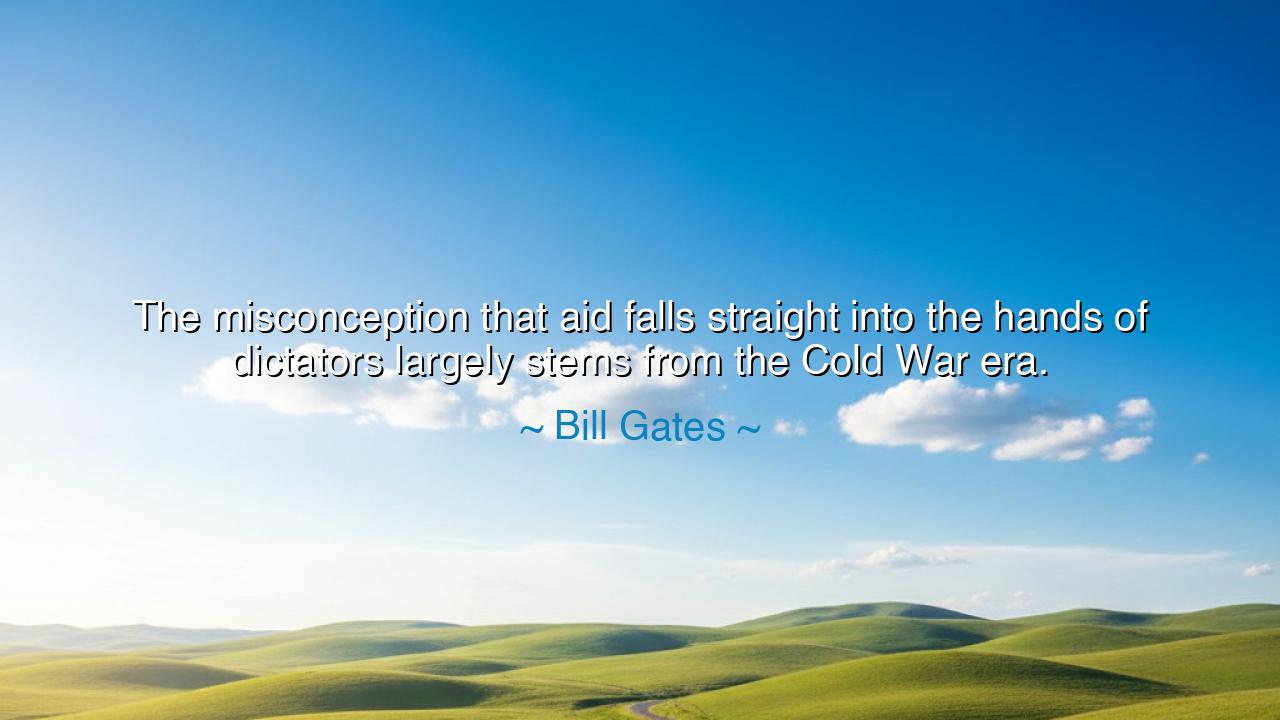
The misconception that aid falls straight into the hands of
The misconception that aid falls straight into the hands of dictators largely stems from the Cold War era.






Hear, O children of discernment, the words of Bill Gates, who declared: “The misconception that aid falls straight into the hands of dictators largely stems from the Cold War era.” In this saying he reveals a truth about memory and misunderstanding, about how the shadows of history shape the fears of the present. For there was a time when the gifts of nations, given not in compassion but in rivalry, did indeed serve tyrants and not the poor. Yet to believe that such is always the case is to be blinded by ghosts, unable to see the good that aid can now achieve.
During the long Cold War, when the world was split between East and West, aid was a weapon as much as a kindness. The United States and the Soviet Union poured treasure into foreign lands, not always to heal the hungry or clothe the poor, but to bind governments to their cause. Dictatorships flourished on both sides, propped up by streams of money, weapons, and advisors. The people suffered while their rulers grew fat, and so the image of aid became stained: not a blessing, but a chain. Thus was born the misconception—that all aid must serve the despot rather than the widow and orphan.
But time moves forward, and the nature of aid has changed. In the decades after the Cold War, organizations arose—international bodies, non-profits, partnerships—that sought not to feed power but to feed children, not to build empires but to build health and education. Vaccines against polio, malaria nets, clean water programs, and schools have saved millions of lives across Africa, Asia, and Latin America. These were not riches delivered to dictators, but lifelines extended to the people themselves. Yet still, the old suspicion lingers, born of history’s scars.
Consider the campaign against smallpox, led in part by the World Health Organization. At a time when mistrust was rampant, nations laid aside rivalry to attack a common enemy of humanity. Aid, in this case, was not corrupted; it was pure, and it succeeded. By 1980, smallpox was eradicated from the earth. No tyrant could claim it, no dictator could twist it to his own gain. It was a gift given to all mankind, proof that aid, rightly given and rightly guarded, can heal the world.
Gates himself has sought to remind us of this truth through his foundation’s work. By supporting vaccines, agricultural development, and educational initiatives, he has shown that aid can bypass the greedy hand of the dictator and flow into the lives of the people. His words are a rebuke to cynicism, a warning against those who say, “Aid never works,” without looking at the millions who live because it has. The past should guide us, yes, but not blind us to the victories of the present.
The lesson, then, is this: beware the chains of old assumptions. Do not let the errors of the Cold War define the possibilities of today. Aid can be misused, yes—but it can also be guarded, directed, and made fruitful. To dismiss it entirely is to abandon the suffering, to walk past the hungry child and say, “There is no hope.” That is not wisdom; it is despair clothed as prudence. True wisdom is to learn from the failures of the past, but to use them to build a better future.
Therefore, O children of tomorrow, take this counsel: when you give, give wisely, but do not withhold your hand out of fear. Support causes that bring aid directly to the people—health, water, education, empowerment. Hold rulers accountable, but do not punish the innocent for the sins of their leaders. For as Gates has shown, the misconceptions of yesterday must not blind us to the possibilities of today. Aid, when rightly given, is not the servant of dictators but the hope of the people—and the measure of our humanity.






LLong
I think this quote raises a deeper question about memory and media. People often cling to past narratives even when the facts evolve. The Cold War indeed created a lens through which aid was seen as political manipulation. But today, with more accountability and data, perhaps that view deserves updating. Yet, mistrust persists. Maybe the real challenge isn’t changing policy — it’s changing perception, which can take generations.
GDGold D.dragon
This perspective feels refreshing because it encourages us to reexamine assumptions. The idea that all aid ends up in the wrong hands has discouraged many people from supporting international development. Still, I wonder if public distrust stems less from history and more from current inefficiencies and media coverage of failures. How can organizations rebuild confidence without oversimplifying the very real risks of misuse?
NDNguyen Dang
I appreciate Gates’s attempt to challenge old stereotypes about foreign aid, but part of me remains skeptical. While it’s true that the Cold War set certain narratives, aren’t there still modern examples where aid empowers authoritarian regimes indirectly? Maybe the issue isn’t just history but the ongoing lack of transparency and accountability in global development funding. Can we really separate politics from humanitarian efforts?
QQuynh
This quote makes an interesting point about how historical context shapes public perception. During the Cold War, aid often was political — a tool to buy influence rather than promote genuine development. But I wonder if the misconception really is outdated. Even today, don’t we still see corruption and mismanagement in some aid programs? Gates seems to suggest progress has been made, but I’d like more evidence that things have truly changed.